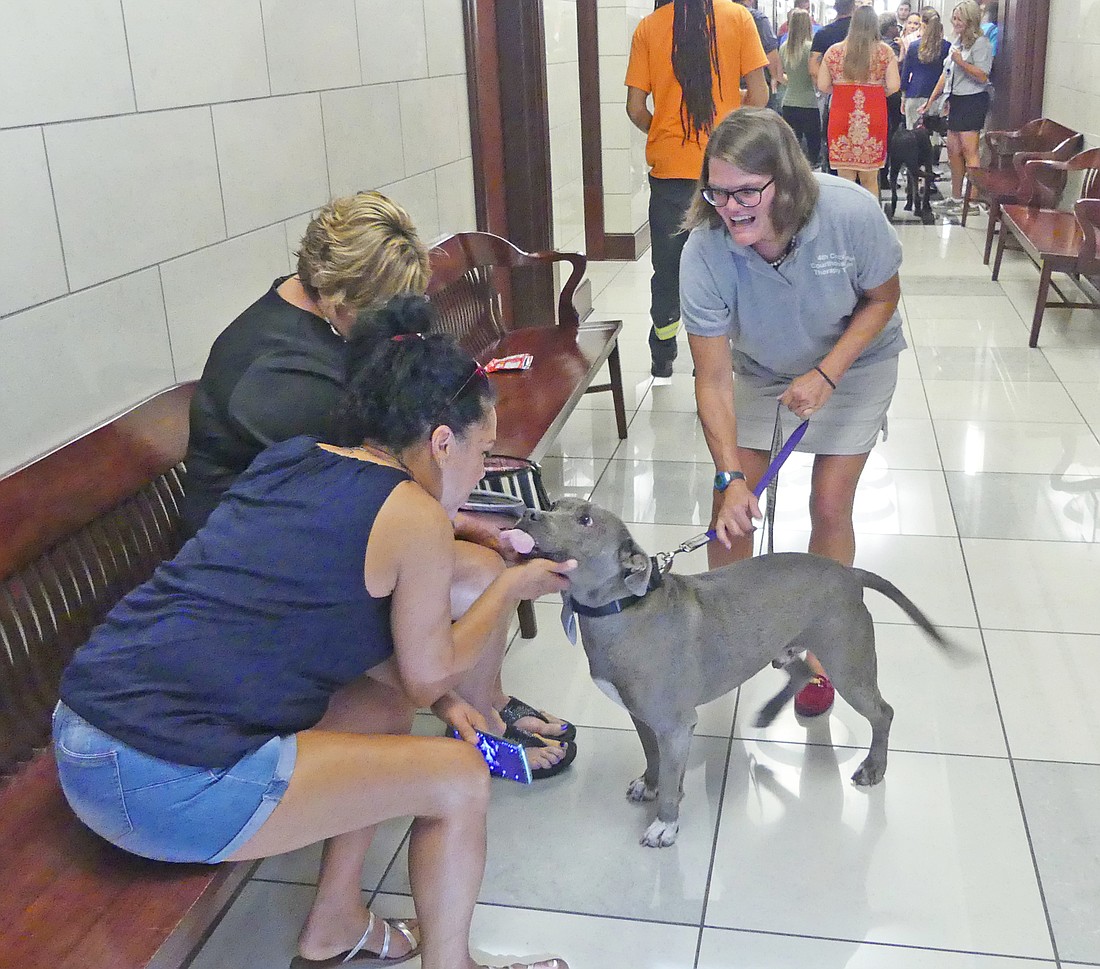
If you’re visiting the Duval County Courthouse and see a dog in a hallway – or even in a courtroom – understand that the dog and the volunteer at the other end of the leash are there to help you feel less anxious about being in the building.
Thirteen volunteer handlers and their dogs are on Jacksonville’s courthouse therapy dogs team. The dogs are evaluated for the required calm and gentle disposition and are trained along with their handlers, who undergo an application process including a background check. The dogs must be cleared by a veterinarian for health and up-to-date vaccinations.
When all the qualifications are met, the handler and dog are registered with the Alliance of Therapy Dogs, a national nonprofit, all-volunteer organization that certifies therapy and facility dogs for courts, hospitals, nursing homes, airports and other public venues.
Unlike service dogs that are trained to assist an individual who has a specific disability or need, therapy dogs are selected and trained to provide comfort to anyone in distress, often in a group setting such as at the courthouse.
Duval County’s courthouse therapy dog program was established in 2012 by Circuit Judge Elizabeth Senterfitt.
At the time, volunteers with the 4th Circuit Guardian ad Litem program were using therapy dogs to comfort children who were abused, abandoned or neglected and making their way through the family court system.
“I contacted Guardian ad Litem and asked if they’d be interested in volunteering at the courthouse,” Senterfitt said.
The program was an immediate hit with judges, the State Attorney’s Office and the Public Defender, she said. Dogs were requested to help comfort children who were victims of abuse or crime, or who had to testify in court or at a deposition.
“It’s positive in so many ways. Dogs make people feel better and a dog is not judgmental,” Senterfitt said.
The state Legislature weighed in on the subject in 2017, unanimously passing a law that permits dogs to accompany children, victims and people with intellectual disabilities when they are called to testify in cases involving abandonment, abuse and neglect.
When Senterfitt retired from the bench in January, Circuit Judge Mark Borello and his judicial assistant, Lisa Gardner, took over supervision of the program.
“I love dogs and Lisa loves dogs. It’s a great program,” Borello said.
Volunteer handler Elizabeth Wallace visits the courthouse regularly with her therapy dog, “Mr. Vito.”
He’s an American pit bull terrier that Wallace rescued from a shelter six years ago.
“We get looks because he’s a pit bull, but he can turn people around,” Wallace said.
She advises people who see Mr. Vito and indicate they’d like to pet him, “I’ve got to warn you – you’re going to get licked.”
“People thank me for bringing him. This can be a stressful place and he takes their mind off the stress,” Wallace said.
On its website, Tallahassee-based Florida Courthouse Therapy Dogs LLC cites a study published in 1982 by the American Veterinary Medical Association that recognized the human-animal bond and confirmed that petting an animal significantly reduces stress and anxiety.
Borello sees the evidence in his courtroom when a therapy dog is present.
“The courthouse can be a stressful place. These dogs are so gentle and well trained. You can tell it really lowers the tension,” he said.